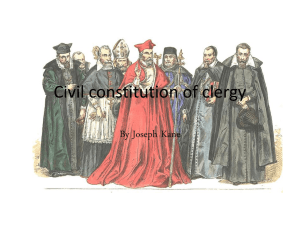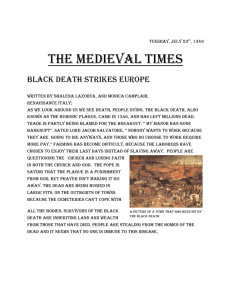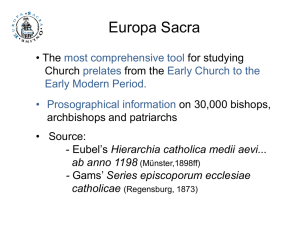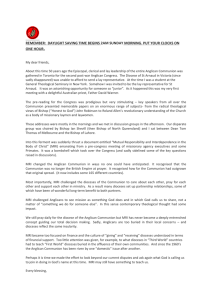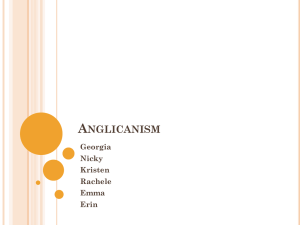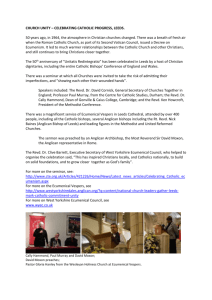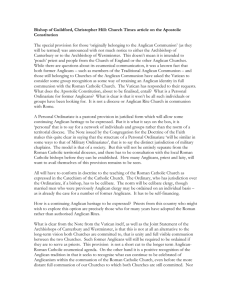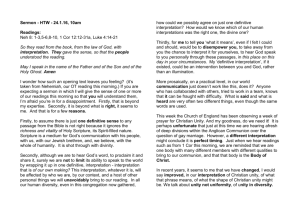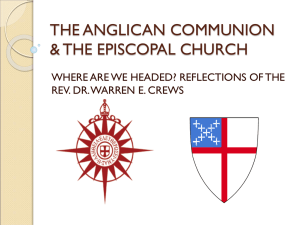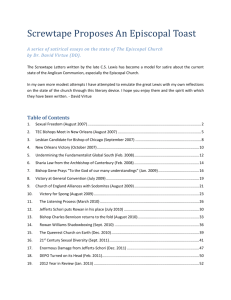Mission of Bishops in the Mystery of the Church: reflections on the
advertisement
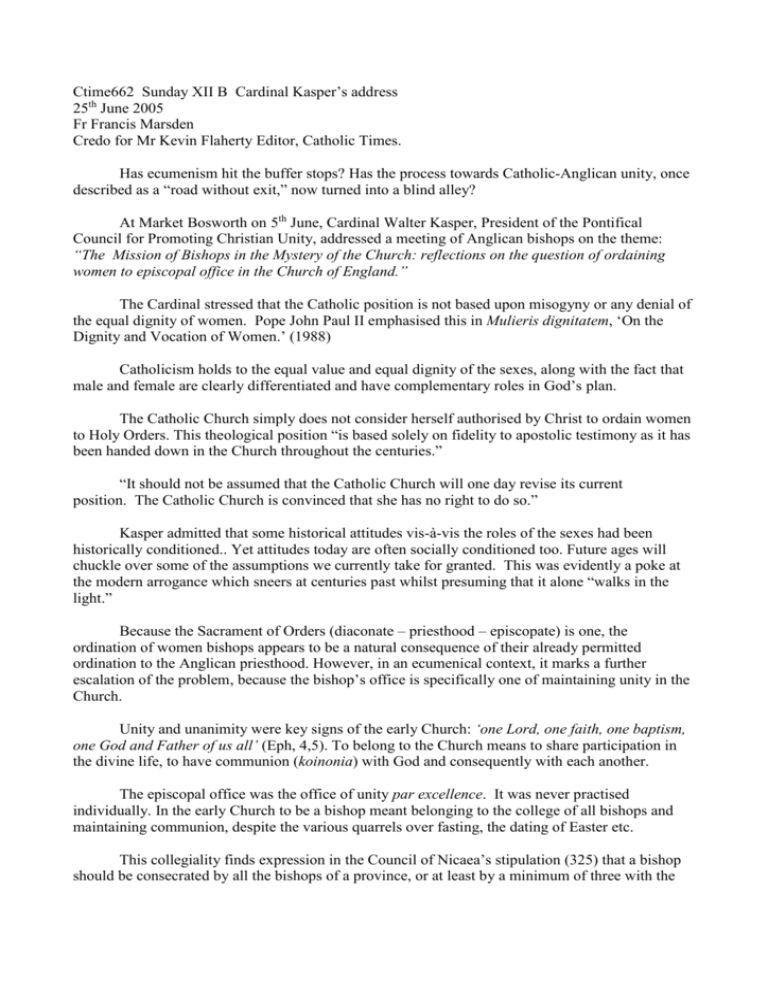
Ctime662 Sunday XII B Cardinal Kasper’s address 25th June 2005 Fr Francis Marsden Credo for Mr Kevin Flaherty Editor, Catholic Times. Has ecumenism hit the buffer stops? Has the process towards Catholic-Anglican unity, once described as a “road without exit,” now turned into a blind alley? At Market Bosworth on 5th June, Cardinal Walter Kasper, President of the Pontifical Council for Promoting Christian Unity, addressed a meeting of Anglican bishops on the theme: “The Mission of Bishops in the Mystery of the Church: reflections on the question of ordaining women to episcopal office in the Church of England.” The Cardinal stressed that the Catholic position is not based upon misogyny or any denial of the equal dignity of women. Pope John Paul II emphasised this in Mulieris dignitatem, ‘On the Dignity and Vocation of Women.’ (1988) Catholicism holds to the equal value and equal dignity of the sexes, along with the fact that male and female are clearly differentiated and have complementary roles in God’s plan. The Catholic Church simply does not consider herself authorised by Christ to ordain women to Holy Orders. This theological position “is based solely on fidelity to apostolic testimony as it has been handed down in the Church throughout the centuries.” “It should not be assumed that the Catholic Church will one day revise its current position. The Catholic Church is convinced that she has no right to do so.” Kasper admitted that some historical attitudes vis-à-vis the roles of the sexes had been historically conditioned.. Yet attitudes today are often socially conditioned too. Future ages will chuckle over some of the assumptions we currently take for granted. This was evidently a poke at the modern arrogance which sneers at centuries past whilst presuming that it alone “walks in the light.” Because the Sacrament of Orders (diaconate – priesthood – episcopate) is one, the ordination of women bishops appears to be a natural consequence of their already permitted ordination to the Anglican priesthood. However, in an ecumenical context, it marks a further escalation of the problem, because the bishop’s office is specifically one of maintaining unity in the Church. Unity and unanimity were key signs of the early Church: ‘one Lord, one faith, one baptism, one God and Father of us all’ (Eph, 4,5). To belong to the Church means to share participation in the divine life, to have communion (koinonia) with God and consequently with each another. The episcopal office was the office of unity par excellence. It was never practised individually. In the early Church to be a bishop meant belonging to the college of all bishops and maintaining communion, despite the various quarrels over fasting, the dating of Easter etc. This collegiality finds expression in the Council of Nicaea’s stipulation (325) that a bishop should be consecrated by all the bishops of a province, or at least by a minimum of three with the consent of all the others. Anyone who had been consecrated by only one bishop should be deposed (Apostolic Constitutions Can. 27). Cyprian of Carthage was the prime theologian of the episcopate. His phrase: ‘episcopatus unus et indivisus’ is well known: “And this unity we ought firmly to hold and assert, especially those of us that are bishops who preside in the church, that we may also prove the episcopate one and undivided.” (De ecclesiae catholicae unitate, 1,5). Each individual Christian needs to be united with his own bishop: ‘The bishop is in the church and the church is in the bishop, and if anyone is not with the bishop he is not with the church.’ Furthermore ‘the Catholic Church is not split or divided’ but ‘united and held together by the glue of the mutual cohesion of the bishops.’ It is not possible to be in communion with just a few bishops and not with others. One has to be in communion with them all, and they with each other. A bishop’s collegiality must be not only with his living contemporaries in the episcopate. [Otherwise they might all get carried away by trendy modernism!] Collegiality reaches back through time to all previous generations – to the Apostles, the Fathers, the Doctors, the Saints and Martyrs of old. It is situated within the apostolic succession and rooted in the sacrament of episcopal consecration. Evidently Cardinal Kasper’s comments here refer to the Catholic episcopate. One supposes they apply to the Anglican bishops only insofar as they consider themselves as bishops à la catholique . Then came his key observation. Any “decision for the ordination of women to the episcopal office can only be made with an overwhelming consensus, and must not in any way involve a conflict between the majority and the minority. It would be desirable that this decision would be made with the consensus of the ancient churches of the East and West. If on the contrary the consecration of a bishop becomes the cause of a schism or blocks the way to full unity, then what occurs is something intrinsically contradictory. It should then not take place, or should be postponed until a broader consensus can be reached.” Cardinal Kasper next applied these principles to the current debate on women bishops. He did this, he said, with inner hesitation, with pain and sadness, but believing he could best serve the cause of ecumenism with open and honest statements. “Bishops are the sign and the instrument of unity within the individual local church, just as they are between both the contemporary local churches and those of all times within the universal Church.” The mutual recognition of all bishops is essential for the unity of the Church. If some bishops in a church are not recognised by other bishops within that same church body i.e. because they are women, then no full church communion or eucharistic communion exists. This is not simply a canon law problem surmountable by flying bishops (as at present), or the creation of a third ecclesial province (as many Anglican traditionalists are demanding). Such arrangements only “paper over the cracks, but they cannot heal the division; one can even go one step further and say that from the Catholic perspective they are the unspoken institutionalisation, manifestation and virtual legitimation of an existing schism.” This breakdown of episcopal unity would mean that the Anglican communion had ceased to be one church. Kasper was too polite to mention it, but this has already happened over the gay bishop issue. Many Third World Anglican provinces no longer recognise the Episcopalian provinces of the USA and Canada. The Catholic Church had invested “great hopes and expectations in the Catholic-Anglican dialogue.” ARCIC had examined the question of priestly ministries. There had been a “pleasing rapprochement” although not “a conclusive resolution or a full consensus.” A re-examination of Apostolicae curae, the 1896 Bull of Pope Leo XIII, [which described Anglican orders as absolutely null and utterly void] had “justifiably aroused promising expectations.” “Then the growing practice of the ordination of women to priesthood led to an appreciable cooling-off. A resolution in favour of the ordination of women to the episcopate within the Church of England would most certainly lower the temperature once more; in terms of the possible recognition of Anglican Orders, it would lead not only to a short-lived cold, but to a serious and long-lasting chill.” The Church of England plays a unique role in the Anglican Communion. It is the historical root of Anglicanism. The Archbishop of Canterbury is ‘the pivotal instrument and focus of unity.’ To be in communion with him is a ‘touchstone of what it was to be Anglican.’ (Windsor Report §99). Kasper did not mention that some Anglican provinces e.g. Nigeria, have eliminated this from their statutes in the light of the gay issue. Although three other Anglican provinces already have women bishops, the Church of England’s decisions have particular significance for Anglicanism as a whole, and hence for ecumenical dialogue. To decide to ordain women to the episcopate would be “a decision against the common goal [full ecclesial communion] we have until now pursued in our dialogue.” The Anglican Communion would be “turning away from the common position of all churches of the first millennium, that is, not only the Catholic Church but also the ancient Eastern and the Orthodox churches.” It would no longer be true that “the Anglican Communion occupied ‘a special place’ among churches and ecclesial communities of the West” (Vatican II). Anglicanism would be re-positioning herself closer to the other Protestant bodies of the 16th century. Their conception of a bishop’s role is quite different from that of the ancient apostolic churches. Kasper then quoted Newman: Is the Anglican via media a viable path? “Where and on what side does the Anglican Communion stand, where will it stand in the future? Which orientation does it claim as its own: the Latin, Greek, Protestant, Liberal or Evangelical? It may retreat to the Anglican principle of comprehensiveness and answer: We are a little of everything. Such comprehensiveness is doubtless a good principle to a certain degree, but it should not be overdone, ….. one arrives at limits where one must decide one way or the other. For without identity no society, least of all a church, can continue to survive. The decision you are facing is therefore an historic decision.”
